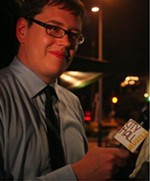City Hall Hustle: Home Away From Home
Council decamps to the Carver and considers housing the homeless
By Wells Dunbar, Fri., Oct. 8, 2010
Agendawise, the day's actions didn't bestow glued-to-your-seat suspense. Controversial zoning cases related to the Domain were postponed (this time, at the behest of a scrambling city staff); elsewhere, except for an end to the ongoing comedy routine that has followed the naming of "Little Zilker Park," the sole hot-button issue was renewing the city's longstanding partnership with Planned Parenthood, still only drawing opposition from a smattering of the hardcore from the local Catholic diocese. (On the former, council decided against "Little Zilker Bluebonnet Park," a blend of two different nominations into one cumbersome compromise apparently pleasing no one.)
But if the agenda lacked any banner items, a thorough, in-depth examination of solutions to the city's homelessness problem added some serious heft. Dianna Lewis, director of the Texas chapter of the nonprofit Corporation for Supportive Housing, led the council through a marathon presentation, weighing the costs and benefits of taking Austin's chronically homeless off the street.
Akin to national "housing first" strategies – which rightfully attest that many problems afflicting the homeless and keeping them on the street (mental health and substance abuse, for instance) can't be addressed until the fundamental need for shelter is met – permanent supportive housing was Lewis' subject. PSH targets residents earning less than 30% of the median family income, and in principle it encompasses leases on rental units also supported by comprehensive, wrap-around services including medical, mental health, and substance-abuse treatment and job training, and is jointly managed by stakeholders inside and outside the city. PSH-eligible populations would include Austin's chronically homeless – that is, those who have been without a home for a year or more or who have experienced recurring episodes of homelessness – as well as the "would-be" homeless housed in jails and treatment facilities, unaccompanied youth or families, and youths "aging out" of state care.
PSH got a push from council this spring, with passage of a resolution directing the city manager to give it priority, fundingwise, out of its housing dollars. Moreover, it called for the construction and operation of 350 PSH units within four years – this, out of an estimated total need of about 1,900 units.
With a $9 million city investment required over four years and approximately $600,000 yearly to continue it after that, PSH may sound like an expensive proposition. However, said Lewis, experience elsewhere has shown that when housing is stabilized, costs associated with homelessness have fallen in other areas. Applied to Austin, fewer EMS response calls for ailing homeless people could save some $297,000 a year, and court costs could fall by $140,000. Jail costs for Travis County could drop by $375,000. Similarly, Central Health costs for emergency room trips, among just the 112 most frequent homeless "users," total some $3.4 million yearly, while the 49 most frequent inpatient care users account for a whopping $5.3 million annually. Additionally, under the Corporation for Supportive Housing's plans, the city would see a roughly 4-to-1 leverage of its dollars, $9 million to $34 million in noncity (largely federal) dollars.
To get to the 350 units, Lewis proposed leasing 100 existing units and building/rehabbing the other 250. To decide who'd receive housing, she described two approaches: the frequent-user approach, for "folks who are frequent users of multiple systems or who may be extremely frequent users of a single system," and a "vulnerability approach," which accounts for risk factors such as early morbidity or those homeless people more likely "to be victimized while they live on the streets."
Following such a dense presentation, council had questions: Chris Riley noted that "new housing tends to be more expensive than existing housing" when asking why the city would want to build or rehab units instead of using existing stock; Lewis replied that while leasing is quicker, "it can become difficult to keep those units," and additionally, new units "tend to be better-quality." Laura Morrison sounded a familiar but important refrain: the importance of neighborhood buy-in. "I personally have seen a successful partnership with a neighborhood. I've also seen failures, and I think we continue to fail to this day. I think we probably even have an example of what could be a failure as of last week," she said (a reference to word getting out about potentially setting Mobile Loaves & Fishes' RV park for the homeless in North Central or Southeast Austin before the city could dialogue with the neighbors). "An appropriate step to take now would be to go to the Austin Neighborhoods Council to say, 'Help us figure out how to do it right.' Because I don't think that we as the city government or whatever can figure that out."
Council can expect to see action from staff as to acquiring the first PSH units within a month or so – but council action on the daunting project is just getting started.
The Hustle has a home on Facebook. Visit www.facebook.com/cityhallhustle or, as always, austinchronicle.com/hustle.
City Hall Hustle
Got something to say on the subject? Send a letter to the editor.










